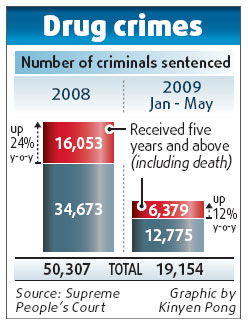Drug-related crimes are growing at an alarming rate and are increasingly characterized by gangs and violence, a senior official of the top court said yesterday.
"A majority of drug crimes are now linked to gangs," Zhang Jun, vice-president of the Supreme People's Court (SPC), told a press conference yesterday.
Last year, courts dealt with nearly 44,000 drugs cases, up by a third year on year. More than 50,000 criminals were sentenced, of whom a third received sentences ranging from five years in prison to capital punishment.
During the first five months of this year, courts handled 14,282 cases, up by 12 per cent year on year.

There is also a rising number of cases involving drug production, usually in large quantities, Zhang said.
"There is a growing trend toward making ketamine on the mainland instead of smuggling it in from abroad; and, also, there are more cases of smuggling and trading of chemical raw materials for drug production," he said.
New types of drugs, such as methamphetamine, are replacing the traditional heroin and opium. Last year and in the first five months this year, there were 12,243 and 5,251 methamphetamine-related crimes, up by 61 percent and 48 percent.
The official said criminals are also using new methods for making and transporting drugs. They rent residential apartments in populous places for production, deliver drugs in mail and even use human mules.
Pregnant women or nursing mothers are also being used, as they do not normally face the death penalty if convicted.
The highest numbers of such crimes are in Guangdong, Guangxi, Yunnan, Sichuan and Guizhou, Zhang told China Daily after the press conference, without giving numbers.
Under the Criminal Law, anyone who smuggles, trades, transports, manufactures or possesses 1 kg or more of drugs is liable to a minimum of seven years' imprisonment. The maximum penalty is death.
The SPC has unified the standards for capital punishment and those liable include drug traffickers using force or participating in international deals, dealers instigating minors to deliver, trade or use drugs, and those providing venues for drug addicts or drug manufacturers.
Experts yesterday called for a severe crackdown on drug-related crimes as well as more prevention efforts.
"Judicial, border and other departments have to be vigilant," said Ma Yunxing, a prosecutor with Beijing Chaoyang district people's procuratorate, adding: "We need to put in more comprehensive efforts and keep a close eye on idle people within communities, especially drug addicts with a high possibility of committing crimes."
More awareness should be spread of the dangers of new types of drugs as people are familiar with traditional drugs such as heroin, but have little knowledge of new ones, which could attract curious youngsters, Ma said.
Qiu Baochang, dean of Beijing-based Huijia Law Firm, called for more education efforts among the young.
"The growing number of cases shows increasing market demand. We have to cut the links in the drug chain, including taking more measures to monitor and supervise entertainment venues, " Qiu said.
On the eve of the annual International Day Against Drug Abuse and Illicit Trafficking today, six people, including a woman, were executed for drug making or trafficking yesterday in Sichuan, Yunnan and Chongqing after the SPC approved the death sentences.
(China Daily June 26, 2009)